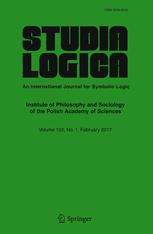Studia Logica
Studia Logica is an international journal of mathematics and logic. The journal includes material on scientific disciplines, with a focus on the use of formal methods of mathematics, and broadly understood logic.[1] The journal is published by the Institute of Philosophy and Sociology of the Polish Academy of Sciences and Springer publications.[1]
 Cover of a Studia Logica Journal | |
| Discipline | Logic, Philosophy, and Mathematics |
|---|---|
| Language | English |
| Publication details | |
| History | 1953-present |
| Publisher | Institute of Philosophy and Sociology of the Polish Academy of Sciences, and Springer |
| 0.724 [1] (2015) | |
| Standard abbreviations | |
| ISO 4 | Stud. Log. |
| MathSciNet | Studia Logica |
| Indexing | |
| ISSN | 0039-3215 (print) 1572-8730 (web) |
| Links | |
History
Its publication began in 1934 in Warsaw, but stopped in 1937. It had been published continuously since December 1953 in changing frequency by the Polish Academy of Sciences. Articles used to appear in Polish, Russian, German, English or French, and their summaries or full translations in at least two of the languages. Kazimierz Ajdukiewicz was chief editor until his death in 1963. The position was later taken by Jerzy Słupecki (1963-1970), Klemens Szaniawski (1970-1974). Under the editorship of Ryszard Wójcicki (1975-1980), who later headed the journal as chairman of the editorial board, Studia Logica moved to publish in English only, and partnered with a Dutch international distributor. It is edited since 2006 by Jacek Malinowski.
Conferences
"Trends in Logic" is a series of conferences in collaboration with Studia Logica.[2] It was founded by Ryszard Wójcicki, and the current editor-in-chief is Heinrich Wansing.[3] Trends in Logic has helped publish 44 volumes for Studia logica Library between 1997 and 2015.[4] Originally, these volumes were published by Kluwer Academic Publishers, and starting in September 2005 (on volume 24), they began publishing with Springer.[4]
The 17th "Trends in Logic" international conference in this series is named Traditional and New Approaches to Deontic logic and Action Modeling, and is being held at the John Paul II Catholic University of Lublin in Poland starting on September 12, 2017.[2]
References
- "Studia Logica homepage". www.studialogica.org. Retrieved 25 February 2017.
- "Call for papers". trends.philosophy.kul.pl.
- Pszczola, Krzysztof. "Trends in Logic – Studia Logica Library". sl.fr.pl. Retrieved 25 February 2017.
- Pszczola, Krzysztof. "Trends in Logic – Studia Logica library: volumes". sl.fr.pl. Retrieved 25 February 2017.
External links
- Studia Logica website
- 50 years of Studia Logica, October 2003